PMP Certification Training
- 88k Enrolled Learners
- Weekend/Weekday
- Live Class
Project Management is the discipline that helps organize and manage a project’s objectives in a controlled manner to produce unique outcomes. The profession of the project manager traces back to the early 19th Century but was not recognized as a distinct profession until the late 20th century. But in today’s market, it is recognized as one of the most reputed professions offering a lucrative salary. But grasping it is definitely not a piece of cake, where you will have to compete with others across the globe. In this Top 30 Project Manager Interview Questions and Answers in 2025 article, I will help you gear up for your interview and ace it.
You can also check out our PMP Certification Training if you want to ensure your job as a project manager. Certifications like PMP, Prince2 Certification, etc., help beef up your resume and are preferred by employers globally.
So, let’s get started!
Below we have discussed the top project manager interview questions with answers in detail. With the help of the most experienced industry professionals, we are able to compile these questions. Let’s go ahead, but for that, don’t forget to watch the interview questions video on the same topic given below:
This Edureka tutorial on Top 30 Project Manager Interview Questions will give you some important questions that will help you ace your interview at the first attempt.
| Project | Program | Portfolio |
| An endeavor was undertaken to produce a unique product or solution | A group of interrelated projects that are managed together | A collection of projects and operations managed under one group to achieve a strategic goal |
| Temporary in nature with defined start and end point | Temporary in nature but lasts longer than the project | Permanent in nature that keeps on changing and is aligned with the strategic planning |
| Follows the project-level plans with the main focus on detailed delivery | Follows the high-level plans that are backed up by detailed plans | Follows the ongoing processes that prioritize and align the portfolio to achieve strategic objectives |
| Has a narrow and defined scope with no changes | Has a wide scope can change over time based on client requirements | Has the widest scope with the strategic perspective of the whole organization |
“Six Thinking Hats” is an interesting way of understanding an issue from a variety of perspectives. You can think from 6 different perspectives or you and your team members could do this. Now, each of the six hats represents a different point of view. Let us talk about it one by one:
First, the white hat: A person who has the white hat will speak only on the information, and you have to consider it from both within and outside the scope of the discussion.
The yellow hat: The yellow hat symbolizes brightness and optimism. The wearer of this hat should bring or think of positive aspects related to the subject as much as possible. They should encourage the team members.
The black hat: A person who has the black hat is responsible for identifying any mistakes or roadblocks. They should be judgmental. Think about everything that could go wrong. Think about worst case scenarios, so that others can find a solution for it.
The red hat: A person who wears a red hat should express his thoughts or feelings. The red hat signifies emotions. You can express emotions and feelings and share likes, dislikes, love, and hate. The objective here is to address the credibility of the feelings that are part of a certain discussion.
The green hat: A person wearing a green hat should come up with new innovative ideas. They should be creative. They should know all the information, and problems and come up with new ideas that solve the problems and help in better productivity. The main purpose of earring this hat is to generate as many new ideas as possible.
The blue hat: The blue hat is the thinking hat(cap). It is all about thinking. It is the hat that ensures the six thinking hat guidelines are observed.
They decided on the agenda and timeline, how long do the sessions take? When do you need to wear a particular hat, and for how long? So the group’s controller should wear a blue hat for the session.

Project management is the discipline that helps implement various processes, methods, knowledge, skills, and experience to achieve the objectives of a unique project. Project management is nothing like the usual management. One key factor that differentiates these two is that project management has a final deliverable and a definite timeline, whereas management is an ongoing process. A project manager must always follow the 6P rule of project management, which is that proper planning prevents poor project performance.
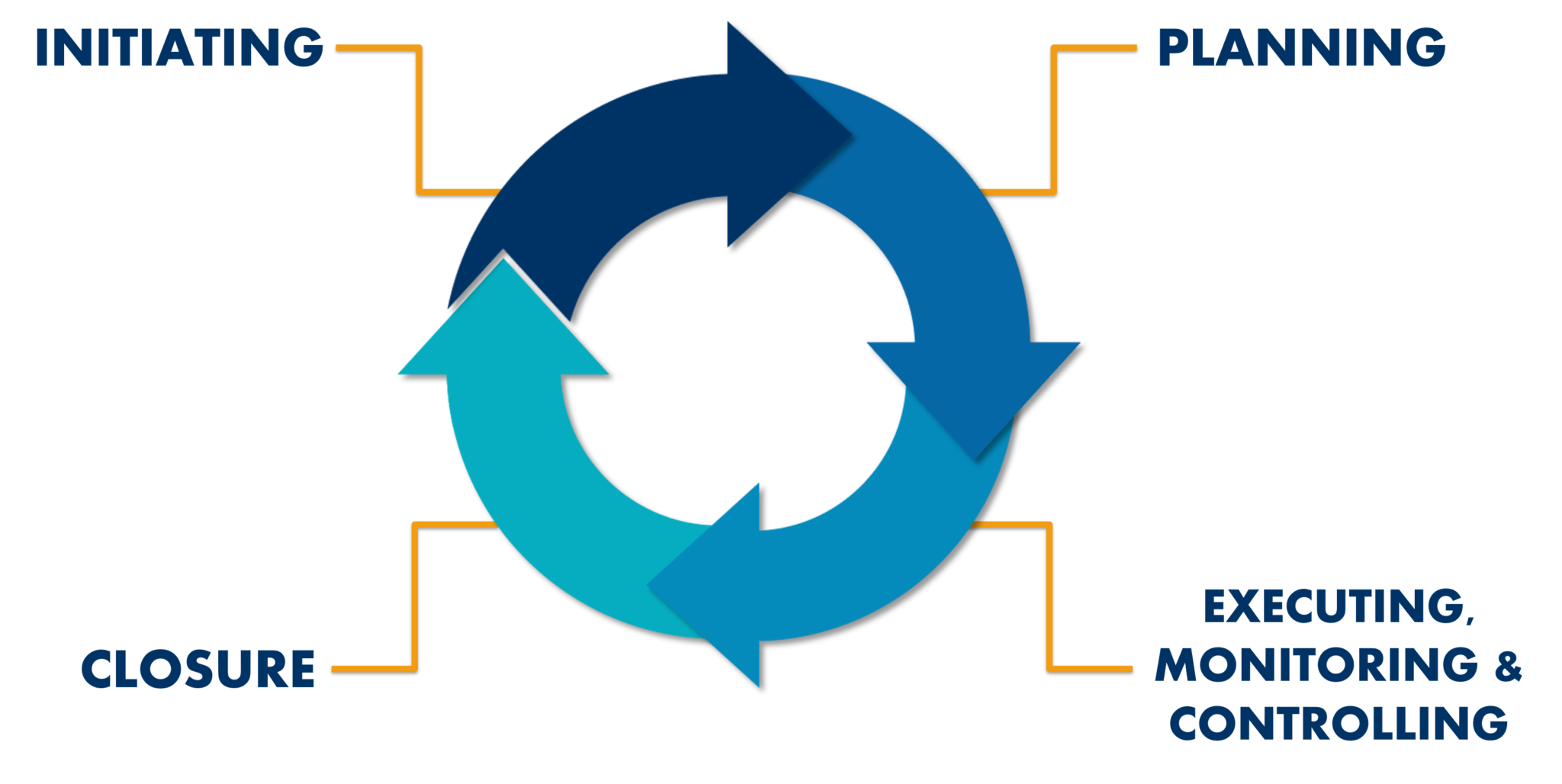
The Project Management Life Cycle is a series of various activities/tasks that are crucial for accomplishing project objectives or targets. This helps structure the efforts and simplify them into a series of logical and manageable steps. The Project Management Life Cycle consists of four simple phrases which are listed below:
The most important skills that a Project manager must possess are:
When you start your job as a project manager first few things that you need to take care of are:
Prioritizing tasks in a project is very important and especially if it is an extensive one. It helps in ensuring the successful and timely completion of your project. In order to prioritize the tasks you should follow the below pointers:
Leadership is a quality that every project manager must possess. Every leader has his own leadership style to guide his team. The leadership style refers to a leader’s characteristic behavior while directing, motivating, guiding, and managing his team to bring the best out of them. In a project, they are responsible for motivating others for better performance, creation, and innovation.
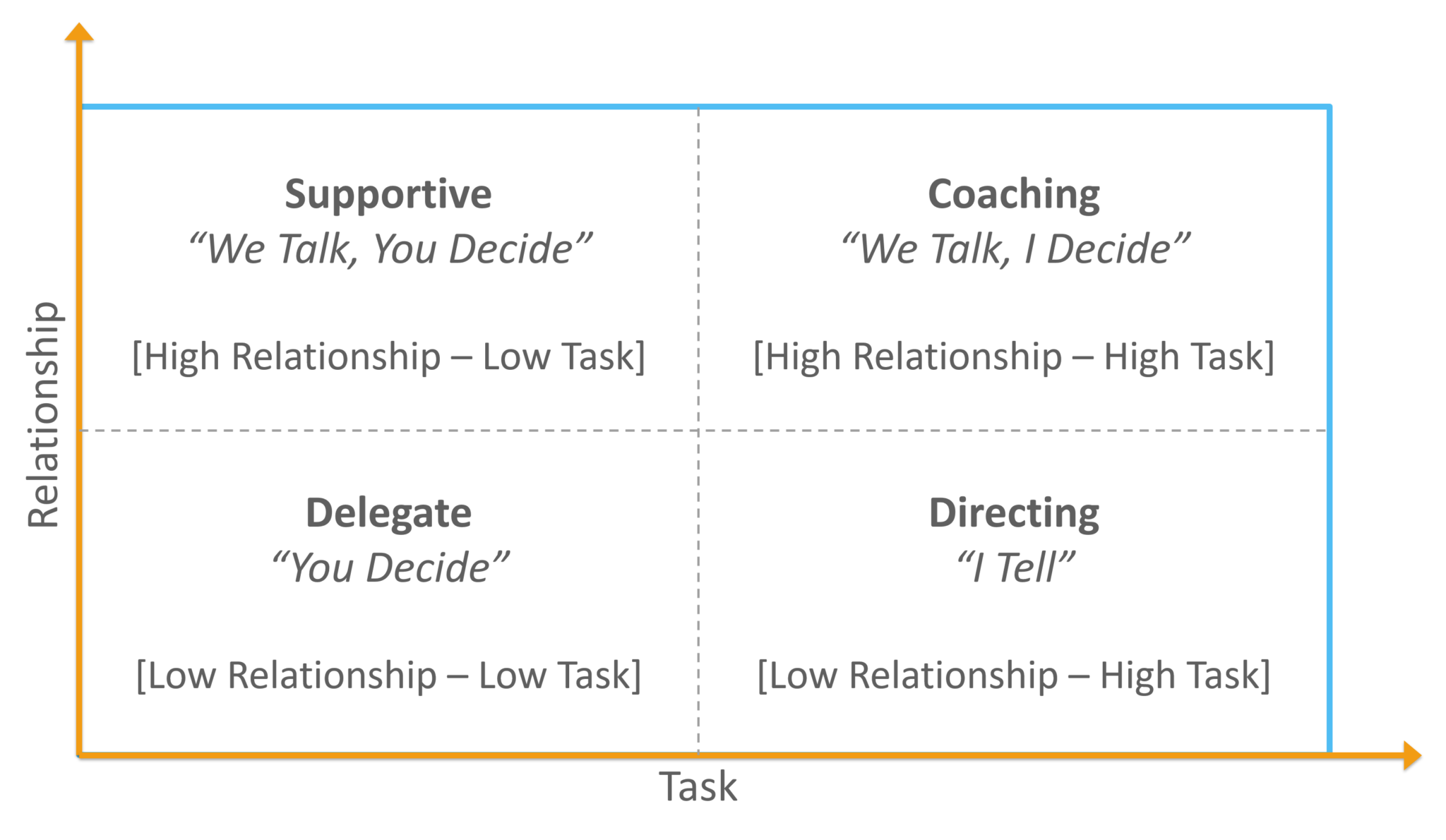
There are basically four types of leadership styles and your leadership style should be situational, depending on the type of team you are working with and the importance of the tasks involved in the project. Below are the four leadership styles:
Before deciding on your ideal project, consider the following questions. These questions will help you in narrowing down your choices while making sure that your productivity maximizes.
A process in the project management framework is a defined way of doing tasks involved in successfully completing a project. These processes define the actions to be taken along with their sequence. Around 49 processes in the project management framework are embedded in various process groups. Process groups are a collection of processes applicable through various stages of a project.
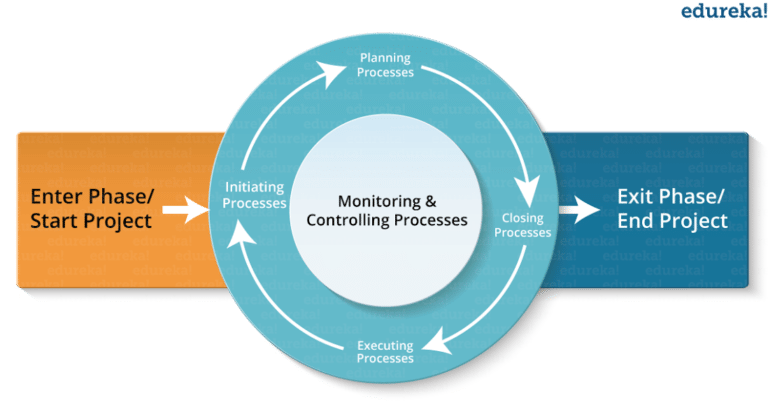
There are 5 process groups into which 10 Project Management knowledge areas and 49 processes are mapped. The five process groups are:
Knowledge Areas are the core technical subject matter that are vital for effective project management. All the 49 processes are primarily part of these knowledge areas where they are grouped based on their commonalities. Below I have listed down the 10 knowledge areas of project management framework:
Since stakeholders hold a high authority and are an integral part of a project having their consent is very important. But sometimes they can be little difficult to handle, in such cases should:
RAID in project management stands for Risk, Assumptions, Issue, and Dependencies. These are very important items that a project manager must know about.
To detect whether your project is on track or falling behind the agreed timeline, you must check the below pointers:
If the answers to these pointers are true then, your project is definitely off the track and you must take immediate action to bring it back on track. Few steps that you might take are:
Not a single methodology can be applied to all types of projects. The selection of project management methodology must be based on the following criteria:
Majorly used tools in the industry:
To bring the best out of your team members, you must:
Trust and agreement is a key factor that facilitates proper communication and coordination in a team. that brings ou the best outcome. To gain agreement from your team members you must:
A fishbone diagram is called a cause and effect diagram or Ishikawa diagram. It is a visualization tool that is used for categorizing the potential causes of a problem in order to identify its root causes. A Japanese quality control expert named Dr. Kaoru Ishikawa invented this fishbone diagram in order to help employees to avoid solutions that will merely address the symptoms of a much larger problem.
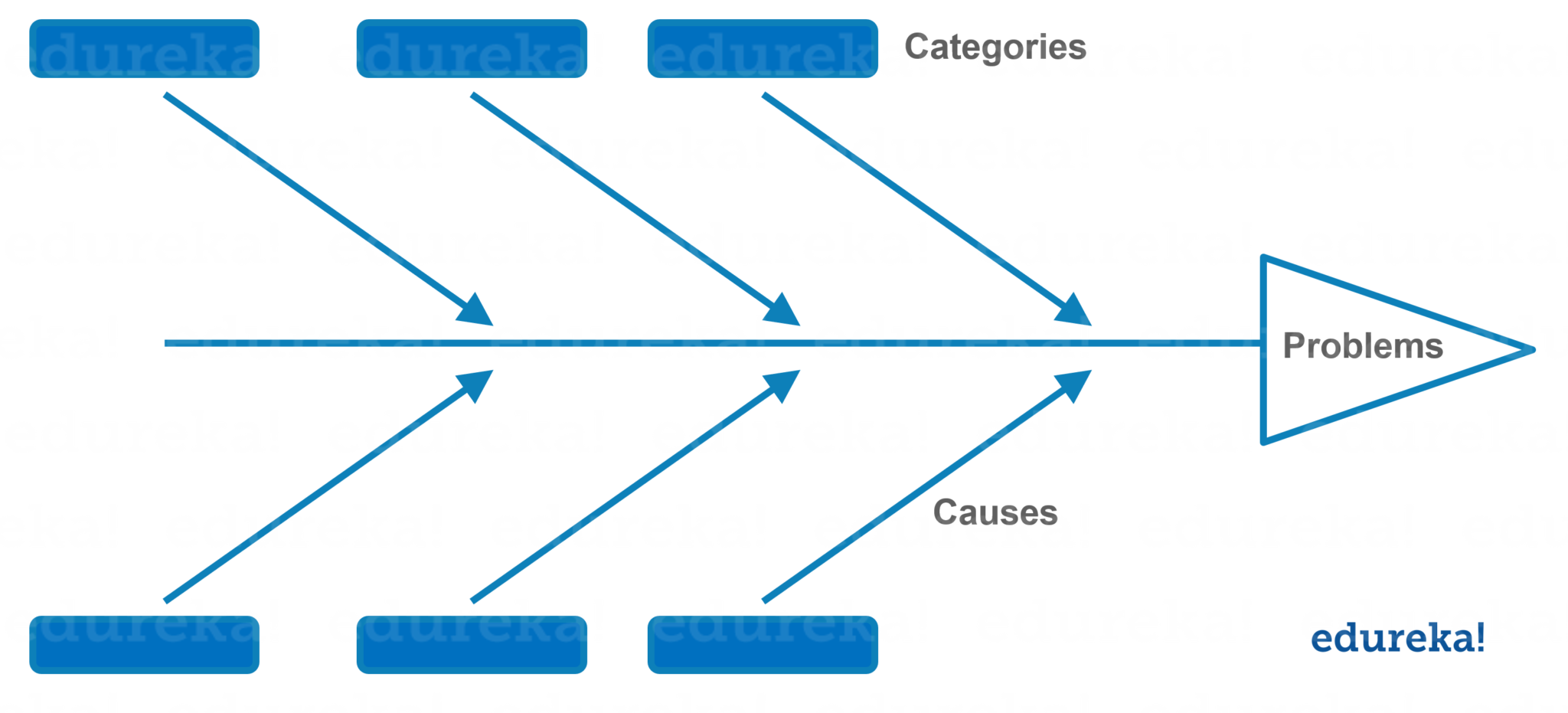
The developmental stages of the team generally consist of:
There are two ways in which you can calculate the three-point estimation:
where P = pessimist, O = Optimist, M = most likely.
Work breakdown structure defines the work activities required for the project completion and the sub-activities of each work requirement. It has a hierarchical structure, segregating concrete/ main activities into logical sub-activities. There are two approaches:
| Issues | Risks |
| Issues are more present focused | Risks are more future focused |
| These always tend to be negative in nature | They can be either, positive or negative |
| Issues are generally documented in the “Issue Register” | Risks are generally documented in the “Risk Register” |
| The response to an issue will be “Issue workaround” | The response to risk is based on “risk response planning” |
Proactive Managers have higher chances of finding out the risks and implementing solutions in order to minimize them. Being proactive, lets them have more control over their project tasks and resources. They can keep a better track of all tasks and issues to work towards implementing small changes and improvements for higher productivity and efficiency. Organizes frequent meetings for developers to talk about their problems, brainstorm solutions, share best practices etc. Compares the actual costs and time spent on tasks every week with the planned numbers.
Risk Probability is the chance that a risk will occur whereas Risk Impact is the cost when a risk does occur.
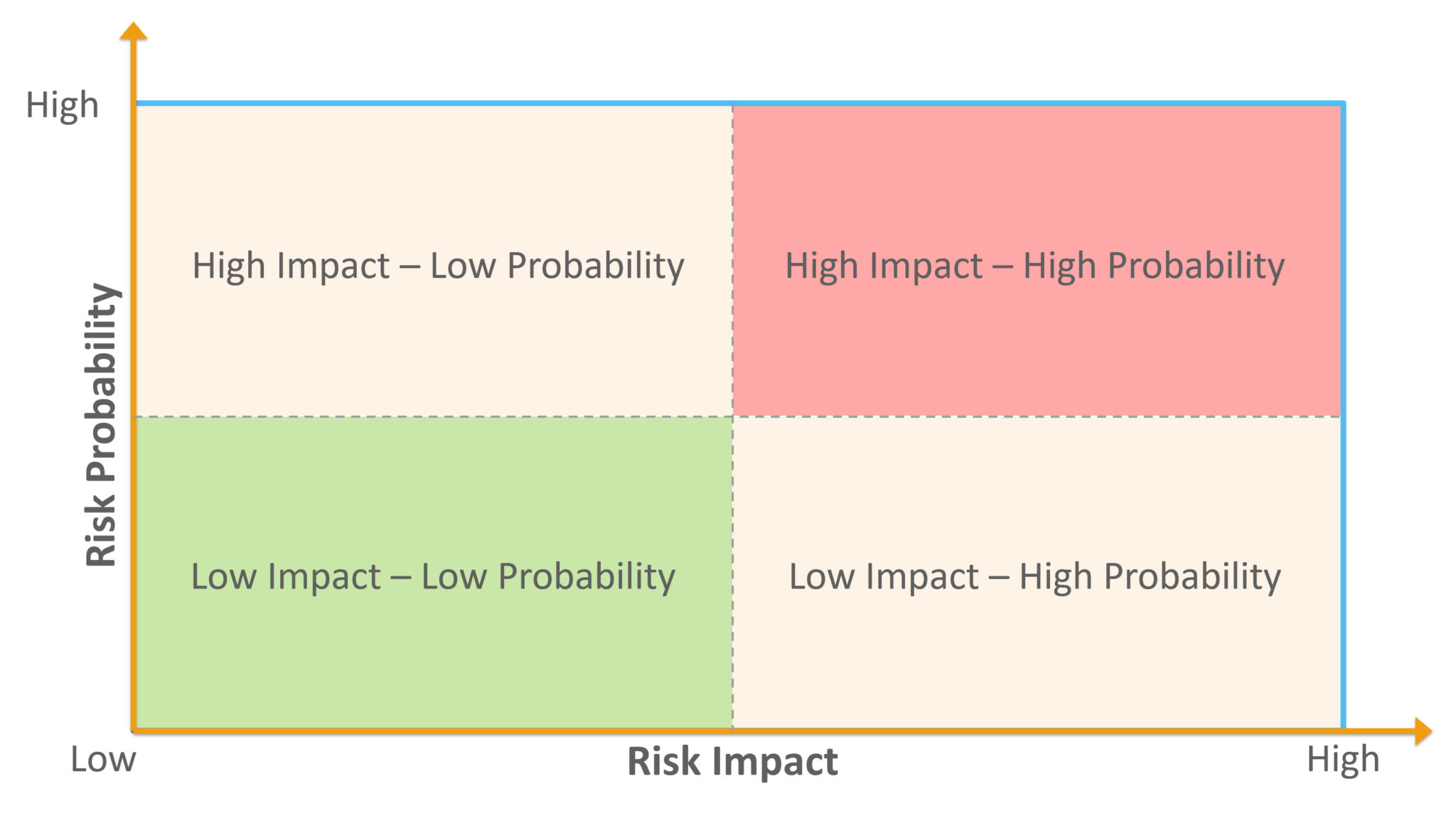
The type of communication you use in your project will completely depend on the type of project you are working on and the type of team you have. Types of communication styles that a project manager uses:
It is a type of contract that is a hybrid contractual arrangement containing aspects of both cost-reimbursable and fixed-price contracts. Time and material contracts resemble the cost-reimbursable type arrangements where they have no definitive end. This contract is generally used in projects whose accurate project size can’t be estimated or when it is expected that the project requirements would most likely change.
To handle an unhappy customer, you must:
Pareto Analysis is a statistical technique in decision-making. It is basically used for the selection of a limited number of tasks which can bring a significant overall effect. This principle follows the Pareto Principle (also known as the 80/20 rule) and states that 80% of the results come from 20% of the actions. It helps in prioritizing the work, especially in large projects with a number of small tasks
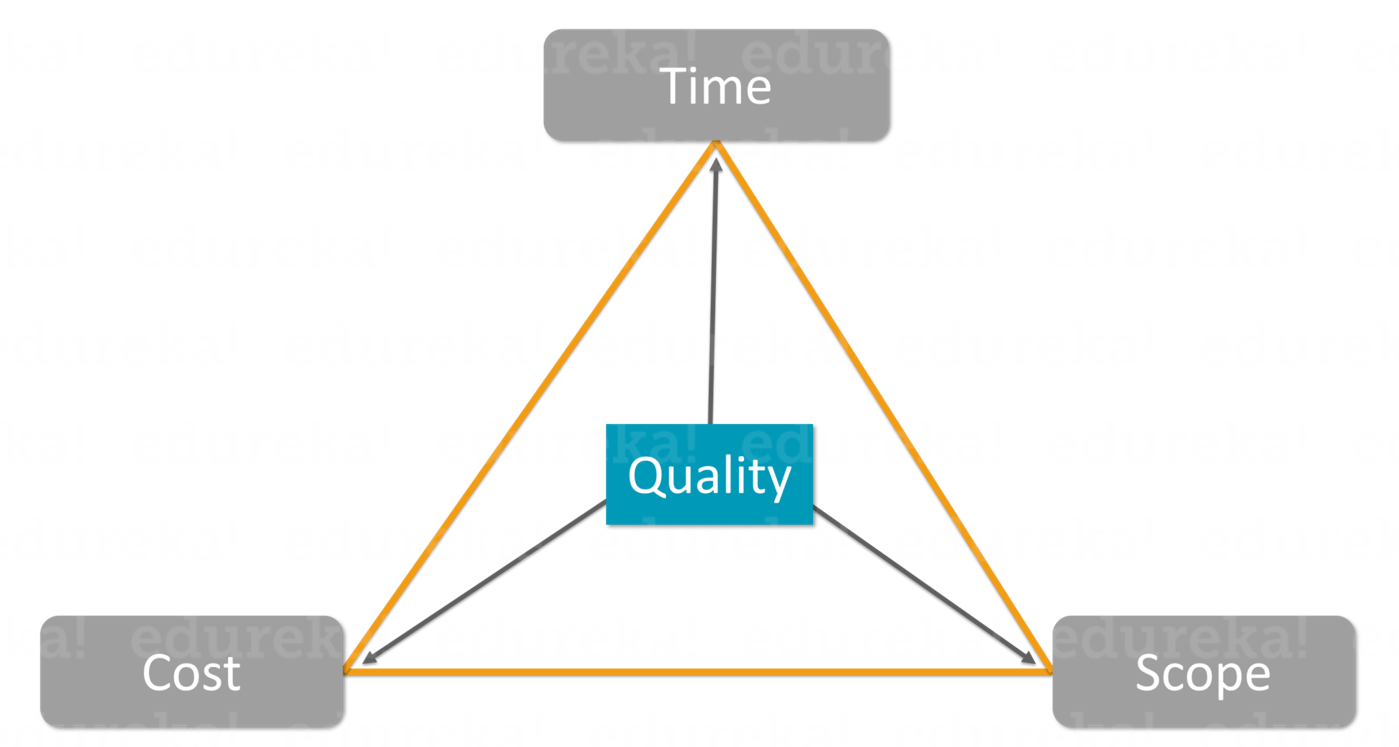
The Triple Constraint Triangle is a combination of three key components which act as the most significant restrictions on any project. Following are the three constraints in this model:
Each of the constraints forms the vertices of the triangle with quality as the central factor.
Majorly encountered risks in a project are:
This brings us to the end of this article on Top Project Management Interview Questions with Answers. I hope it helped you improve your knowledge. I wish you all the best in your interview. Happy learning.
Related Article: PMP Exam Questions & PMP Interview Questions
If you found this “Project Manager Interview Questions” article relevant, check out the Project Management Training by Edureka, a trusted online learning company with a network of more than 250,000 satisfied learners spread across the globe.
Got a question for us? Please mention it in the comments section and we will get back to you.
Find out our PMP Training in Top Cities/Countries
| India | Other Cities/Countries |
| Bangalore | UK |
| Hyderabad | US |
| Pune | Canada |
| Chennai | Australia |
| Mumbai | Singapore |
| Kolkata | Saudi Arabia |
 Thank you for registering Join Edureka Meetup community for 100+ Free Webinars each month JOIN MEETUP GROUP
Thank you for registering Join Edureka Meetup community for 100+ Free Webinars each month JOIN MEETUP GROUPedureka.co
Great explanation bro really helped me in my interview.
Nice blog. I got relevant information.
Thanks for the great article post :-)
I totally agree with – These are top 30 project management interview question now, you can clear your interview through the article :-)
I took the training from Koenig Solutions and you know what right now I am working with the reputed company and getting the good package.